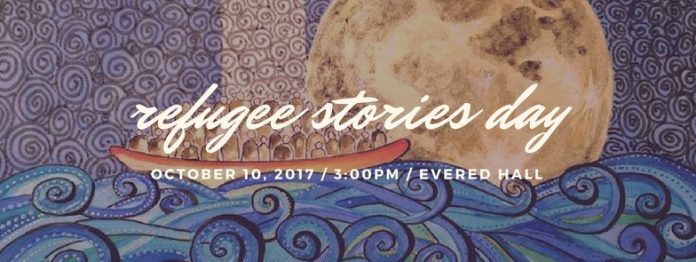On Tuesday, October 10, UFV’s Amnesty Club hosted Refugee Stories Day, an event aimed at sharing the experiences of refugees living in the Fraser Valley, with members of the UFV community. Housed in Evered Hall, it took place from 3-5 p.m.
The event took the form of a panel presentation by four members of the community and their role in alleviating the refugee crisis which, in the wake of the Syrian civil war and related conflicts, has left thousands displaced.
Michelle Murray-Schlitt, president of UFV Amnesty, spoke to The Cascade about the event, and the goals of UFV Amnesty.
“There were roughly 50 people in attendance,” said Murray-Schlitt. “We heard from [UFV political science professor] Ron Dart about the importance of discussing the structural issues behind refugee crises.”
Bibi Dilmahomed, an outreach worker with Abbotsford Community Services (ACS), spoke to guests about ACS’ role in the resettlement of Syrian refugees.
“It was great to hear firsthand updates on how these newcomers to the Fraser Valley are doing,” said Murray-Schlitt. “[Especially] from someone working directly with them.”
Also present at the event was Tima Kurdi, a hairstylist who immigrated to Canada in 1992.
On September 2, 2015, Kurdi’s sister-in-law Rehanna Kurdi and her two sons, Ghalib and three year-old Alan Kurdi, drowned in the Aegean Sea as they tried to make their way from Turkey to Greece.
Alan’s death brought international attention to the refugee crisis after a posthumous photograph of the young boy taken by Turkish journalist Nilüfer Demir surfaced through the media.
Since then, Kurdi has stepped into the public spotlight in an effort to bring attention to the humanitarian crisis facing Syrian refugees, a crisis which has cost Kurdi a sister-in-law, and two young nephews.
“We hope that students will be challenged by these personal stories,” says Murray-Schlitt. “We want to [relate] the things students see on the news to a different and more personally challenging and impactful level. We all have a role to play in these events, and it’s important that students consider their individual role in the scope of these [humanitarian] issues.”
To that end, Murray-Schlitt hopes having guests like Kurdi speak at UFV nurtures an understanding of the injustices affecting marginalized groups at home and abroad, and encourages students to begin a dialogue about them.
“We want to open up conversation, and challenge people to consider the value of stories and experiences [of] people outside the groups they usually interact with. Ultimately, we want to create a dialogue about human rights, and our role in maintaining them here at home [and] abroad.”
Examples of recent actions taken by UFV Amnesty include campaigning for Indigenous rights, and doing outreach work.
“[We’ve written] letters on behalf of political prisoners such as Mahmoud Abu Zeid, who was jailed in Egypt for taking a picture in 2013,” said Murray-Schlitt. “[As well,] we have campaigned on behalf of Indigenous rights to the land, which the proposed Site C Dam will affect, and we hope to partner more with Indigenous groups on campus and in the community as the year progresses.”
UFV Amnesty encourages all students interested in joining to reach out through Facebook, or email them at ufv.amnesty@gmail.com.


